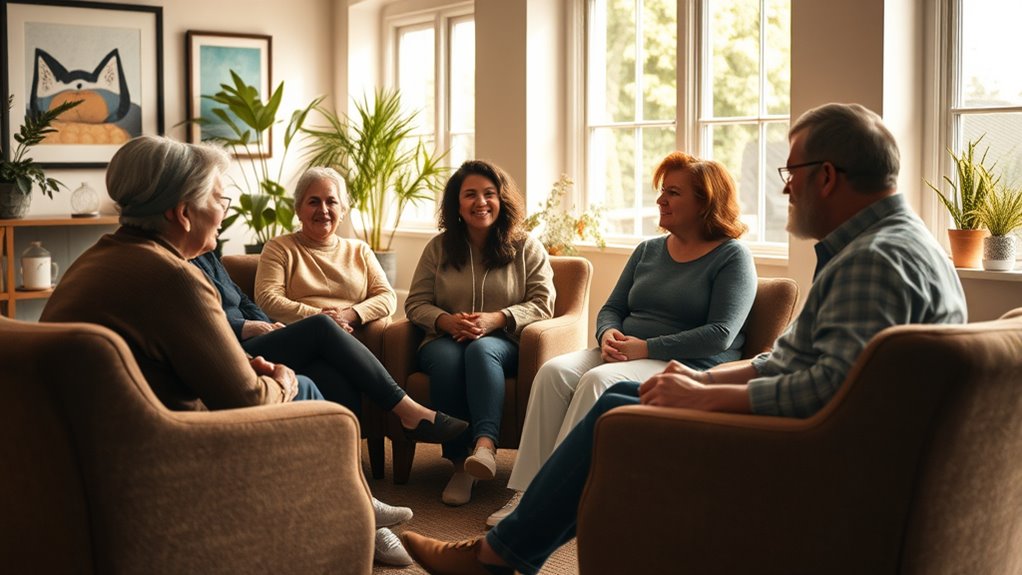Joining a divorce support group can help you find a caring community where you feel understood and validated. It offers practical advice for coping, sharing personal stories, and reducing feelings of loneliness. These groups foster honesty, resilience, and hope by connecting you with others who face similar challenges. If you want to discover more ways to navigate this tough time and build your support network, keep exploring how these groups can benefit you.
Key Takeaways
- Join local or online divorce support groups to connect with others sharing similar experiences.
- Seek out community organizations or mental health providers that facilitate peer support meetings.
- Use social media platforms and forums to find virtual groups focused on divorce recovery.
- Attend workshops or events that promote community building and emotional healing during separation.
- Consult with therapists or legal professionals who can recommend reputable support networks.

Are you feeling overwhelmed by the emotional upheaval of divorce? It’s completely natural to feel a whirlwind of emotions—anger, sadness, confusion—as you navigate this challenging time. One of the most effective ways to manage these intense feelings is by connecting with others who understand what you’re going through. Divorce support groups can provide the sense of community and validation you need to start healing. These groups aren’t just about sharing stories; they offer practical coping strategies that help you process your emotions and regain a sense of control. When you join a support group, you’ll find others who have faced similar struggles, and that shared understanding can be incredibly comforting. They can offer insights into how they managed their own emotional upheaval, giving you new tools to cope with feelings of loneliness or despair.
In addition to emotional support, support groups often serve as a resource for legal advice. While group members aren’t legal professionals, many have gone through similar processes and can point you toward helpful legal resources or advise you on questions to ask your attorney. This shared knowledge can empower you to better understand your rights and responsibilities during divorce proceedings. It’s important to remember, though, that advice from peers should complement, not replace, professional legal counsel. Attending these groups can also help you prepare questions to discuss with your lawyer, ensuring you’re making informed decisions about child custody, property division, or other legal matters.
Participating regularly in a divorce support group allows you to build a network of people who genuinely understand your experience. This sense of belonging can combat feelings of isolation that often accompany divorce. As you listen to others’ stories and share your own, you’ll realize you’re not alone in this journey. The supportive environment encourages honesty, which can accelerate your emotional recovery. Plus, seeing others work through their own difficulties can inspire hope and motivate you to take positive steps forward. Additionally, these groups can sometimes provide information about mental health resources, which can be vital in supporting your overall well-being during this transitional period. Building a community of support can also help you develop coping strategies tailored to your unique situation. Engaging with people who understand your experience can also introduce you to support resources that you might not find on your own.
Ultimately, divorce support groups are about more than just emotional relief—they’re about reclaiming your strength and confidence. They help you develop coping strategies that are tailored to your needs, and they connect you with a community that understands the complexities of divorce. With a mix of shared experiences, practical advice, and emotional validation, you’ll find the support necessary to move through this transition with resilience. Remember, seeking help from a support group isn’t a sign of weakness; it’s a proactive step toward healing and rebuilding your life. Recognizing the importance of maintaining emotional health during this time can significantly enhance your recovery process.
Frequently Asked Questions
How Do I Find a Support Group Suited to My Specific Needs?
To find a support group suited to your specific needs, start by exploring personalized matching services online. These platforms connect you with niche communities tailored to your situation, interests, and preferences. Consider reaching out to local mental health organizations or online forums where you can ask for recommendations. By focusing on niche communities, you’ll discover groups that truly understand your experience and offer the support you need during this challenging time.
Are Online Support Groups Effective for Emotional Healing?
Ever wondered if online support groups really help with emotional healing? They can be very effective because of virtual anonymity, which lets you open up without fear of judgment. While you might feel more emotionally vulnerable, sharing your feelings in a safe, supportive environment can accelerate healing. Online groups connect you with others experiencing similar struggles, making it easier to find understanding and encouragement during tough times.
What Should I Expect During My First Support Group Meeting?
During your first support group meeting, you can expect a welcoming atmosphere where emotional vulnerability is encouraged. Everyone shares at their own pace, and group confidentiality is emphasized to guarantee a safe space. You might introduce yourself and listen to others’ stories. Remember, it’s normal to feel nervous, but most find comfort in knowing they’re not alone. Trust the process and be open to connecting with others who understand your experience.
How Can I Stay Committed to a Support Group Long-Term?
To stay committed long-term, focus on maintaining group consistency by attending regularly and actively participating. Peer accountability helps keep you motivated, so share your goals and challenges openly. Set reminders for meetings, and remind yourself of the benefits of consistent support. Remember, your commitment not only helps you heal but also strengthens the group, creating a safe space for everyone’s growth during this difficult time.
Can Support Groups Help With Legal or Financial Advice?
Support groups are like a guiding light, offering more than emotional comfort—they can provide legal guidance and financial advice. While they’re not lawyers or financial planners, members often share resources, experiences, and referrals that can help you navigate complex issues. You’ll find it’s a safe space to ask questions, gain insights, and feel less alone when tackling legal or financial challenges during your separation journey.
Conclusion
Joining a divorce support group can really help you feel less alone during this tough time. Around 75% of participants report feeling more hopeful and supported after attending. By sharing your experiences and listening to others, you’ll find strength and encouragement to move forward. Remember, community makes the journey easier, and you don’t have to do it alone. Taking that first step into a support group could be the most empowering decision you make today.










